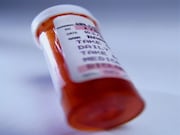When target is higher versus lower dosage, uptitration stops further from recommended dosage
TUESDAY, Oct. 1, 2019 (HealthDay News) — Uptitration of drugs for chronic systolic heart failure stops farther away from the recommended dosage for drugs with higher versus lower recommended dosages, according to a research letter published online Oct. 1 in the Annals of Internal Medicine.
Henrike Arfsten, M.D., from the Medical University of Vienna, and colleagues used an existing registry to examine data from 3,737 outpatients with heart failure with reduced ejection fraction who were enrolled between January 2006 and December 2011 to examine when uptitration of drugs stops.
The researchers found that for β-blockers, angiotensin-converting enzyme inhibitors, and angiotensin receptor blockers, the prescribed dosages increased after one year. Significantly fewer patients received the maximum recommended dosage when it was higher than when it was lower for all three classes. These observations were confirmed by comparing the probabilities of reaching the maximum dosages: The difference in predicted probabilities was 10, 34, and 13 for β-blockers (0.33 for bisoprolol and nebivolol and 0.23 for metoprolol), angiotensin-converting enzyme inhibitors (0.56 for ramipril and 0.22 for lisinopril, enalapril, and fosinopril), and angiotensin-receptor blockers (0.41 for candesartan and 0.27 for valsartan), respectively.
“We believe that the differences we observed are large enough to affect patient outcomes,” the authors write. “We have been unable to identify other studies that have reported this effect, and we propose that the effect be called a ‘cognitive illusion based on the maximum target dosage.'”
Copyright © 2019 HealthDay. All rights reserved.








